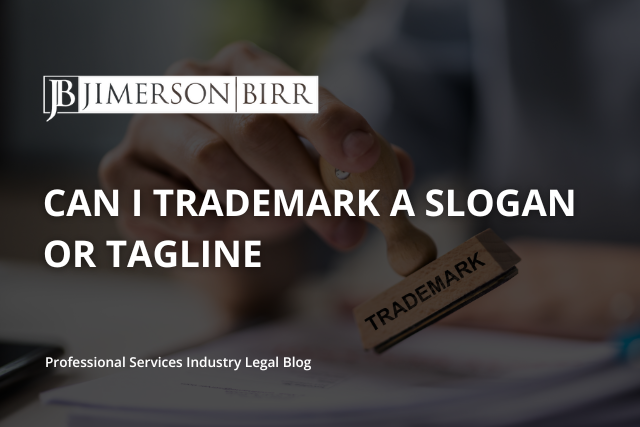Slogans, like “JUST DO IT”, can be among the best and most memorable trademarks a company can use. But how protectable are they, and what can a business do to make sure that its slogan is protected?
Slogans as Trademarks
At its core, a trademark is a goods/source identifier. In plain English, that’s something a business uses so that customers can quickly identify the source of the goods they buy. The idea being that, every time you see a shoe box that says “JUST DO IT”, even if you have no idea who or what Nike is, you’ll understand that the shoes in the box are of a similar kind and quality to the last set of shoes you saw in a box that said “JUST DO IT”. Over time, and with repetition, consumers learn that shoes with the particular slogan might be desirable, and the business, presumably, doesn’t have to work as hard to sell its products based on the goodwill that the slogan has come to represent in the minds of consumers.
The Problem with Descriptive Slogans
Not all slogans are created equal. The strongest trademarks are distinctive, not descriptive.
That’s where most businesses fail. Most businesses naturally want their slogans to describe their goods. Businesses with this mindset might come up with slogans like “MIKE’S PIZZA, THE BEST IN TOWN” or “JOE’S SHOES, FOR THE SHARP DRESSED MAN.” The thinking goes, if the slogan describes the goods, consumers will know what’s on offer and will be drawn to purchase the goods. So, a man who wants to dress well will know to go to Joe’s Shoes. The problem with this is that these kinds of slogans are considered descriptive in a trademark sense.
Descriptive trademarks identify the qualities or characteristics of the goods or services offered under the trademark. This class of trademarks is considered the weakest and can only be protected after long, continuous, and exclusive use of the mark. The logic behind this is that anyone who genuinely believes that their pizza is “the best in town” should be able to say so freely. So, although Mike may want to use “MIKE’S PIZZA, THE BEST IN TOWN”, Chris should also be able to use the slogan “CHRIS’S PIZZA, THE BEST IN TOWN” due to the descriptive (as laudatory in this case) nature of the slogan. This makes the “MIKE’S PIZZA, THE BEST IN TOWN” slogan weak and not of much long-term use to the business.
A slogan like “MIKE’S PIZZA, THE BEST IN TOWN” only becomes protectable when the consumers have become so accustomed to the slogan that they stop seeing it for its descriptive quality and associate it with the source of goods.
For example, “AMERICAN AIRLINES” started as a descriptive name, simply an airline based in America. But because of decades of continuous and exclusive use, consumers now associate it with a specific company, not just a category of service.
Why Distinctive Slogans Work Best
The strongest slogans don’t describe the product at all. Instead, they create a memorable association that consumers connect to the brand over time. Think of:
- “JUST DO IT” for shoes
- “AMERICA RUNS ON DUNKIN’” for coffee and donuts
Neither describes the product’s qualities, but both have become instantly recognizable as brand identifiers. Although there may be some initial brand education that goes into informing consumers about the goods or services offered under those slogans, once the consumer is informed, they are less likely to forget or be easily confused by someone else’s slogan.
The Ornamental Use Problem
Another issue to keep in mind with slogans is the problem of ornamental use versus actual trademark use. Trademarks should be source identifiers, not necessarily direct consumer draws, although that line can certainly be blurred sometimes. Traditionally, trademarks are placed on packaging or tags. Shirts, for example, could have a trademark placed on the label behind the collar, or discreetly on the breast pocket.
The United States Patent and Trademark Office (USPTO) observes that “a slogan prominently displayed on the front of a t-shirt may be considered merely ornamental use and not trademark use. That is, most purchasers of the t-shirts would not automatically think the slogan identified the source of the goods but would view the slogan only as a decoration on the goods.” Of course, most of us have probably seen “JUST DO IT” written prominently across the front of a t-shirt. In that case, “JUST DO IT” is not strictly functioning as a trademark and is likely an ornamental use. But that ornamental use is incidental to the trademark value (the goodwill) that the slogan has accrued through time and extensive exclusive and continuous use.
Why It Matters for Your Business
The subtleties of descriptive versus distinctive use and whether a use is merely ornamental are subjective and often difficult to pin down, even for professionals. But getting those issues right can be the difference between investing your time, effort, and money in a strong slogan that sticks with consumers of your products, and having Mike open his “THE BEST IN TOWN” competition next door to your “THE BEST IN TOWN” business. Having a seasoned trademark lawyer conduct a search and provide a clearance opinion is the best way to get this right.
To ensure your slogan builds long-term value and your brand is fully protected, contact Jimerson Birr.

